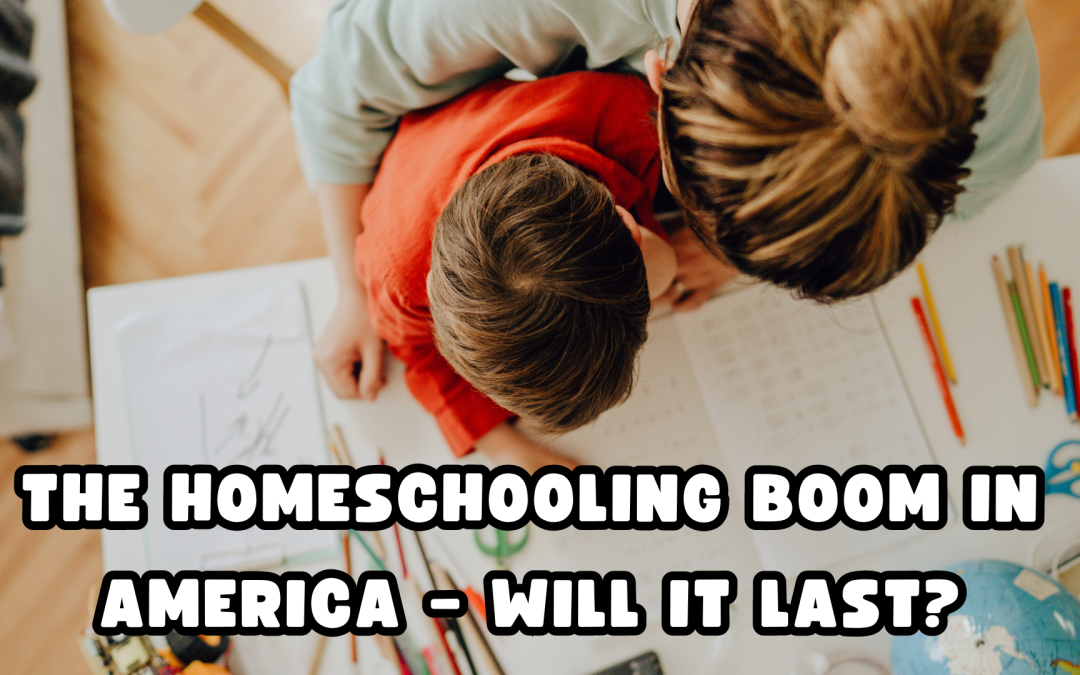By now, we’re all informed of the fact that the forced 2020-21 “school at home” protocol precipitated a huge spike in the number of US registered homeschoolers. We’re also well aware that the increased numbers have held fast, with a slight decrease after public school enrollment picked up again and that, since then, numbers have remained above pre-pandemic registration figures.
What we haven’t yet been able to predict is whether this registration boom will translate into long-term growth in homeschooling, or whether the numbers will flatten out, or even decrease, over time.
A SHORT BACKGROUND CHECK
The practice of parents opting out of public education systems and keeping their children at home under close parental instruction and care has long been a traditional practice in America. This “practice” has become mainstream, and homeschooling is now the fastest-growing education modality in America as well in other countries including Russia, France, the UK, Japan, South Korea, and others.
According to an analysis completed by the Washington Post in October 2023, the increase precipitated by the pandemic has continued through the 2022-23 school year. (Takeaways from The Post’s home-schooling data analysis and poll – The Washington Post.)
THE TAKE AWAY
According to an October 2023 article published in Axios, the bottom line is that “being able to tailor the education to the individual is one of the things that has been extremely personally persuasive for people to come to homeschooling and then decide to stay.” (What’s behind the increase in homeschooling (axios.com).
The Washington Post survey “reveals that a dramatic rise in home schooling at the onset of the pandemic has largely sustained itself through the 2022-23 academic year, defying predictions that most families would return to schools that have dispensed with mask mandates and other COVID-19 restrictions.”
WHAT’S REALLY HAPPENING?
As with most newly minted “movements,” it still remains to be seen whether homeschooling is “having a moment, or whether it is establishing itself as a permanent feature among education options in the US.” (How Homeschooling Evolved from Subversive to Mainstream – JSTOR Daily.)
There are several indications that the “permanent feature” option may be the destiny for homeschooling. Chalkbeat (Chalkbeat – National), in collaboration with the Associated Press, reported on how public-school districts across the country, “anxious about prolonged declines in enrollment, are trying creative ways to register families—including equipping bus drivers to call parents.” In other words – public schools are nervous about how many students are being transferred to homeschooling, private schools, and charter schools.
The impacts of exponential growth in home schooling on all aspects of the American educational system are just beginning to surface. The traditional “homeschool parent” who has been concerned about public school practices and social systems is now voicing a much broader scope of reasons for choosing homeschooling.
Amber Okolo-Ebube, a Texas homeschooling mother, wrapped it up like this: “Parents saw how far behind their children actually were and said ‘I can do better.’ “
Jonnie Lan, Director of the Central California Section of APA, noted that “Many people may choose this way of educating their children for faith-based reasons. As a person of faith, I found that academic-based reasons were more important to our family.”
TEMPORARY BOOM OR LASTING SUCCESS
Dixie Dillon Lane, writing for the Institute for Family Studies, analyzed the situation in this way: “I argue that this reality helps explain the pandemic-related homeschooling boom in a previously overlooked way. Homeschooling’s 2020 growth was rapid and extensive, not because the pandemic made a portion of normative-schooling Americans change their minds about homeschooling, but because homeschooling was, in fact, already in line with substantially held American beliefs about localism in education. The new homeschoolers’ minds, in other words, did not need to be changed. In my view, most already considered homeschooling to be a reasonable practice. The Pandemic simply provided a reason for them to engage in it.” (Is the Homeschooling Boom Here to Stay? | Institute for Family Studies (ifstudies.org)).
HOW TO DO HOMESCHOOLING RIGHT
The following considerations for consistent and quality homeschooling efforts should be considered by the federal government, state and local school districts to ensure consistency throughout the system:
- The federal government should give parents the option of accepting support if they homeschool their children. The support could include online resources, training programs and financial assistance when available and possible.
- Even though homeschooling is legal in all 50 states, regulations vary from state-to-state. Homeschooling regulations should be the same across the states and should be designed to provide legal protections for the interests of homeschooled children.
- A uniform accountability system for the quality of homeschool education should be created. In the interest of their children’s futures, homeschool parents should be monitored and held accountable for the quality of education they provide to their children.
- Homeschool children should have consistent access to the additional benefits of public education and should not be excluded from those benefits. Homeschooled children should be able to access public school extracurricular activities and should be allowed the option of taking standardized tests through the public school system.
- Homeschool regulations should not limit the flexibility of parents to design a curriculum that meets the individual needs of their children. Parents must be free to design curricula tailored to each student.
To again quote the words of historian Dixie Dillon, “Educators will not escape the current decade without reckoning with these pressures and beliefs. As we think creatively as a society about the possibilities going forward, we would do well to remember that homeschooling, tutoring, learning pods, and micro-schools are just new versions of the old American conviction that while government should protect the right to schooling, it is parents who usually know best how to provide it for their children.”
OTHER RESOURCES
Why Homeschooling Is Growing | American Center for Transforming Education (discovery.org)
Homeschooling is booming (morningbrew.com)
What’s behind the increase in homeschooling (axios.com)
Crafting a Tailored Education: Unveiling the Power of Homeschool Curriculum – BrightChamps Blog
